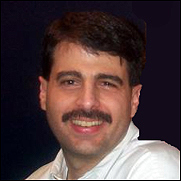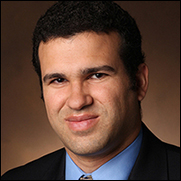The extraordinary, creative efforts of five engineering faculty members to adapt to their new teaching environments in Fall 2020 were recognized recently with a Teaching Innovation Award from Philippe Fauchet, Bruce and Bridgitt Evans Dean of Engineering.
The honorees quickly converted their in-person classes to online formats due to the COVID-19 pandemic and made innovative, effective use of technology for teaching and learning, Fauchet said.
“In a short amount of time, they adapted with new tools and practices. They demonstrated resilience, ingenuity and creative approaches to problem-solving,” Fauchet said. ““In addition to their flexibility and as a hallmark of a Vanderbilt engineering education, their dedication to their students’ learning and well being never wavered.”
 Dan Arena, associate professor of the practice of computer science: Arena’s multi-faceted approach in two CS classes necessitated revamping all existing course materials. He developed over 90 PowerPoint lectures and delivered those lectures through the creation of more than 100 Camtasia videos, each roughly 10-15 minutes in length. To create remote learning cohorts, he used MS-Teams, which had just been modified substantially in mid- 2020 to address the sudden need for remote collaboration in the workforce. Arena acted as project leader for each team and provided personal feedback.
Dan Arena, associate professor of the practice of computer science: Arena’s multi-faceted approach in two CS classes necessitated revamping all existing course materials. He developed over 90 PowerPoint lectures and delivered those lectures through the creation of more than 100 Camtasia videos, each roughly 10-15 minutes in length. To create remote learning cohorts, he used MS-Teams, which had just been modified substantially in mid- 2020 to address the sudden need for remote collaboration in the workforce. Arena acted as project leader for each team and provided personal feedback.
 Leon Bellan, associate professor of mechanical engineering: Bellan had students construct their own musical instruments from household objects. His virtual lectures on string resonance, pipe resonance and other acoustics phenomenon tied basic physics to musical instruments. Then, students had to tune the instruments and predict their pitch based on physics. He also has created, programmed and debugged a home-based remote teaching lab set-up that would permit students to interact with instrumentation hardware over the Internet. Students are able to see the lab rig over Zoom but will interact with the experiment as if it were connected to their own USB port.
Leon Bellan, associate professor of mechanical engineering: Bellan had students construct their own musical instruments from household objects. His virtual lectures on string resonance, pipe resonance and other acoustics phenomenon tied basic physics to musical instruments. Then, students had to tune the instruments and predict their pitch based on physics. He also has created, programmed and debugged a home-based remote teaching lab set-up that would permit students to interact with instrumentation hardware over the Internet. Students are able to see the lab rig over Zoom but will interact with the experiment as if it were connected to their own USB port.
 Tyler Derr, assistant professor of computer science: In his first semester at Vanderbilt, Derr quickly adapted a social network analysis class to add flexibility to monthly problem sets so students could adjust their schedules, and to offer four virtual guest speakers who were topic experts in industry and academia, whom the students found insightful and enjoyable. He also set up a peer review mechanism for group members and for others for the final project presentation. Students reported his genuine interest in them, their schoolwork and their mental health.
Tyler Derr, assistant professor of computer science: In his first semester at Vanderbilt, Derr quickly adapted a social network analysis class to add flexibility to monthly problem sets so students could adjust their schedules, and to offer four virtual guest speakers who were topic experts in industry and academia, whom the students found insightful and enjoyable. He also set up a peer review mechanism for group members and for others for the final project presentation. Students reported his genuine interest in them, their schoolwork and their mental health.
 Romina Del Bosque, assistant professor of the practice of biomedical engineering: Del Bosque created a new course, Bioinstrumentation 1 and its teaching lab, which was mostly taught remotely. She made kits for each student containing electronic components and instruments. Students enjoyed the hands-on experiences regardless of the challenges of working more independently and not physically next to a lab partner. She also developed a new 3D CAD elective to provide students with valuable skills that could improve their marketability with potential employers
Romina Del Bosque, assistant professor of the practice of biomedical engineering: Del Bosque created a new course, Bioinstrumentation 1 and its teaching lab, which was mostly taught remotely. She made kits for each student containing electronic components and instruments. Students enjoyed the hands-on experiences regardless of the challenges of working more independently and not physically next to a lab partner. She also developed a new 3D CAD elective to provide students with valuable skills that could improve their marketability with potential employers
 Kevin Galloway, research assistant professor of mechanical engineering: Galloway introduced his students to the Mural platform, an online resource for collaboration, ideation and conceptual developments. Students enjoyed the notes feature to brainstorm and share ideas. Galloway also created maker kits for students, sanitized all the tools they would need for class, and mailed boxes across the country to students enrolled remotely. Students said the best thing about Galloway’s “How to Make (Almost) Anything” class is how personal he takes each student’s ability to create.
Kevin Galloway, research assistant professor of mechanical engineering: Galloway introduced his students to the Mural platform, an online resource for collaboration, ideation and conceptual developments. Students enjoyed the notes feature to brainstorm and share ideas. Galloway also created maker kits for students, sanitized all the tools they would need for class, and mailed boxes across the country to students enrolled remotely. Students said the best thing about Galloway’s “How to Make (Almost) Anything” class is how personal he takes each student’s ability to create.
The awards include a one-time $1,000 prize.
Original article by: Brenda Ellis
brenda.ellis@vanderbilt.edu